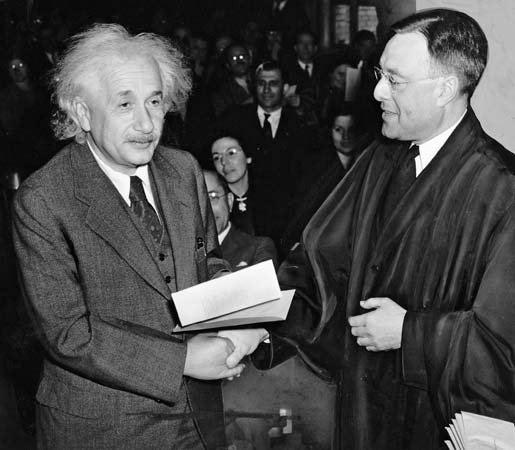The great scientist and a physicist.

Albert Einstein (14 March 1879 to 18 April 1955) was a German-conceived hypothetical physicist.
He built up the general hypothesis of relativity,
one of the two mainstays of current material science (close by quantum mechanics).
Einstein's work is additionally known for its impact on the logic of science.
Einstein is best known in pop culture for his mass vitality identicalness
recipe E = mc2

(which has been named "the world's most well known condition").
He got the 1921 Nobel Prize

in Physics for his "administrations to hypothetical material science",
specifically his disclosure of the law of the photoelectric impact,
a vital advance in the development of quantum hypothesis.
Close to the start of his profession,
Einstein felt that Newtonian mechanics was never again enough to
accommodate the laws of established mechanics with the laws of the electromagnetic field.
This prompted the advancement of his uncommon hypothesis of relativity.
He understood, in any case, that the rule of relativity could likewise be reached out
to gravitational fields, and with his resulting hypothesis of attraction in 1916,
he distributed a paper on general relativity. He kept on managing issues of
factual mechanics and quantum hypothesis, which prompted his clarifications
of molecule hypothesis and the movement of particles.
He additionally explored the warm properties of light which established the framework
of the photon hypothesis of light. In 1917, Einstein connected the general hypothesis of relativity
to show the huge scale structure of the universe.
He was going by the United States when Adolf Hitler came to control in 1933 and,
being Jewish, did not backpedal to Germany, where he had been a teacher at the Berlin Academy of Sciences.
He settled in the U.S., turning into an American subject in 1940.
On the eve of World War II, he supported a letter to President Franklin D. Roosevelt
alarming him to the potential advancement of "to a great degree capable bombs of another sort"
and prescribing that the U.S. start comparative research.
This in the end prompted what might turn into the Manhattan Project.
Einstein bolstered protecting the Allied powers,
however to a great extent criticized utilizing the newfound atomic splitting as a weapon.
Afterward, with the British thinker Bertrand Russell, Einstein marked the Russellâ€"Einstein Manifesto,
which featured the peril of atomic weapons.
Einstein was partnered with the Institute for Advanced Study in Princeton,
New Jersey, until his passing in 1955. Einstein distributed in excess of
300 logical papers alongside more than 150 non-logical works. On 5 December 2014,
colleges and chronicles reported the arrival of Einstein's papers, containing in excess of
30,000 one of a kind records. Einstein's scholarly accomplishments and
inventiveness have made "Einstein" synonymous with "virtuoso".
WE SALUTE HIM FOR HIS GREAT WORKS IN PHYSICS AND BEING A SCIENTIST.